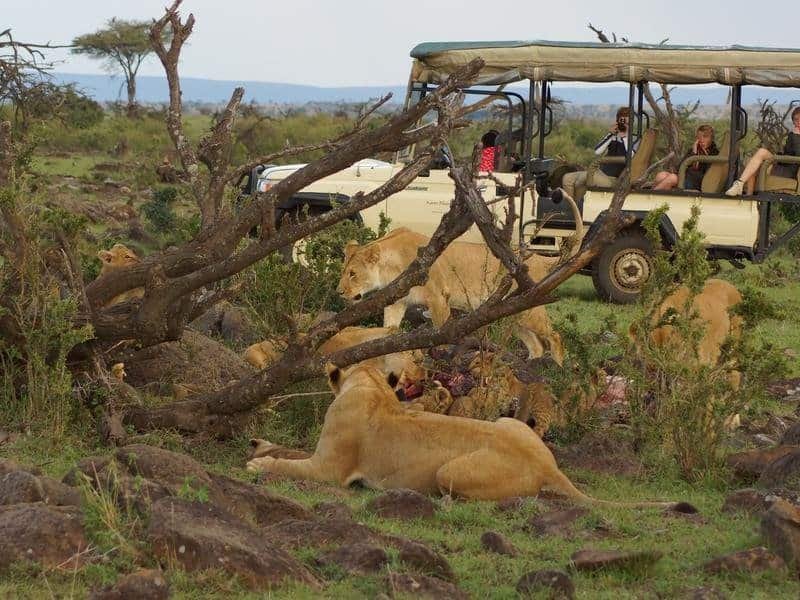
Going on an African safari is an exciting and unforgettable experience, and has probably been on your bucket list for years. If you’re like me, you’ve always dreamed of cruising across the savanna in an open jeep to spot elephants, lions, giraffes and more roaming free in their natural habitats.
However, as exhilarating as a safari adventure may be, it’s important to remember that you are entering the animals’ natural habitat. As a result, there are certain rules and guidelines that you should follow to ensure your safety and the safety of the wildlife.
In this beginner’s guide to safari etiquette, I will outline some of the key things to keep in mind on an African safari.
A Beginner’s Guide to Safari Etiquette: Respecting the Animals and the Wild
| Safari Etiquette Tip | Description |
|---|---|
| Follow your guide’s instructions | Your safari guide is a trained professional. Listen to their guidance and instructions at all times. |
| Maintain a respectful distance from wildlife | Remember the animals are in their natural habitat. Do not crowd them and back away if they seem stressed. |
| Remain inside your vehicle | The vehicle provides a barrier for safety. Do not exit without permission for your safety and to avoid stressing animals. |
| Dress appropriately | Wear lightweight, neutral-coloured clothing that will not startle animals if you are near them. |
| Speak quietly | Keep conversations low and avoid loud noises to prevent disturbing animals and other guests. |
| Do not feed or bait wildlife | Feeding can lead to aggression and dependence on humans for food. Do not bring or attempt to feed animals. |
| Minimize your environmental impact | Properly dispose of rubbish and respect authorized areas to protect the habitat. |
| Choose a responsible tour operator | Look for operators committed to conservation, sustainability and supporting local communities. |
| Respect the local culture | Be courteous, ask questions respectfully and recognize cultural customs may differ from your own. |
On my first safari in Zimbabwe a decade ago, I quickly found out that following proper etiquette is essential for an ethical, safe and rewarding experience. The animals’ well-being along with the preservation of the land should remain top priorities. By always heeding the excellent advice of my guide, I aimed to tread lightly and respectfully within the animals’ domain.
Here I’ll share insights from my introduction to respectful safari travel in the hopes of helping prepare other first-timers. The main areas I’ll cover include behaviour guidelines, appropriate interactions, recommended attire, and sustainability considerations when embarking on an unforgettable African safari adventure.
Follow the Lead of Your Guide

The first and most critical rule I learned was to follow our guide’s instructions to the letter. These experienced professionals ensure your safety while working to get you as close as reasonably possible to the animals for amazing photographs. But they also understand that an African safari should emphasize minimal disruption of the animals and their habitat.
Resist any urges to demand getting closer for pictures or approaching animals directly. This can cause distress and provoke aggression in the wildlife. Trust your guide to provide fulfilling sightings from a safe distance. Also heed their advice about when photography or noise should be limited to avoid stressing certain animals. Their expertise makes all the difference.
Maintain a Respectful Distance from Wildlife
While encounters with elephants, giraffes, lions and more may feel incredibly intimate on a safari, these remain wild animals in their natural environment. We must remember that as eager tourists, we are the visitors. Excitement should never override considering what is appropriate and comfortable for the wildlife.
Crowding animals causes anxiety which negatively impacts their well-being. Your guide will observe their reactions so they can adjust their proximity. If they move away, you’ve encroached too close. Backing off allows them to relax while still providing you thrilling experiences observing their behaviors.
It is obviously even more important to keep a safe distance when on foot on a walking safari or if you encounter wild animals in camp. Learn from your guide so that you can act correctly when you return to Africa for your next adventure, when perhaps you might be driving on safari yourself…
Remain Inside the Vehicle
No matter how tempted you may be, refrain from stepping outside your safari vehicle except in designated areas under guide supervision. The vehicles act as protective barriers, so exiting them takes away that sense of security on both sides.
The animals recognize the cars as non-threatening, but a human suddenly outside appears as a potential predator. No matter how safe you feel, never give in to the urge to step out – your photos and memories will be just as amazing from inside. And you’ll be alive to enjoy them, too.
Remember that your actions can endanger everyone in the vehicle/group, not just you. Don’t be that person.
When it’s time for a coffee break or sundowners, your guide will find a safe spot where you can get out and stretch your legs. And enjoy that G&T.
Dress in Neutral Safari Attire
Another etiquette guideline I was grateful to learn beforehand was dressing appropriately for a safari. Bright colors, jangling jewellery and bold patterns may unintentionally startle animals if you end up in close proximity.
Natural earth tones help you blend into the scenery, whether that’s greens, tans or greys. Lightweight, cool fabrics work best in the warm climate. Sunglasses, hats and sun protection are wise along with clothing that covers your limbs to guard against insects. Comfortable walking shoes prove useful when touring parks and lodges between drives.
Check out this detailed guide to what to wear on safari here.
Speak in Hushed Tones on Game Drives
While enjoying lively banter with loved ones and new friends on safari is part of the fun, it’s important to keep chatter low and avoid sudden loud noises when in the presence of wildlife. This prevents disrupting their natural behaviour. Whisper when observing the animals up close during your drives, or save your questions for when you are further away.
Also keep in mind that most safari experiences use open game drive vehicles allowing sounds to carry. And if there is another vehicle at the sighting, be mindful that other travellers are there enjoying the peace of nature as well. Fascinating guided commentary always enlightens your sightings without needing loud exchanges.
Don’t Even Think About Feeding or Baiting Wildlife
This is an absolute prohibition for ethical reasons, as well as being very stupid. Feeding wild animals trains them to relate humans with food, which breeds dependence and aggression when that food is not provided. They must rely on their natural food sources and instincts to find it. Any safari operator forbidding this practice – in other words all the ones I work with or would ever work with – cares deeply about the animals’ well-being.
Bringing food along could also unintentionally attract animals into the vehicles, creating hazardous situations. Part of embracing the safari experience involves observing the animals engaged in their natural hunts and foraging activities from a reverent distance.
Travel with Minimal Impact on the Environment
Another essential aspect of safari etiquette that may be less obvious involves making sustainable choices to protect the land you’ve come to explore. This includes disposing of any litter properly in designated receptacles to avoid polluting, sticking to authorized trails, and never removing “souvenirs” like shells or stones.
Support tour operators committed to eco-friendly practices like recycling, renewable energy, and employing members of local villages. All the accommodation providers I work with use green principles where possible, which can include everything from water conservation (using refillable water bottles) to chemical-free cleaning. Keeping your safari’s footprint to a minimum preserves Africa’s glory for the future.
Be patient
Going on an African safari is an incredible experience, but it can also require patience. The animals are wild and may not always be visible or easy to spot. Don’t get discouraged if you don’t see everything you were hoping to see. Enjoy the experience and appreciate the beauty of the natural world around you.
Foster Cultural Exchange Through Curiosity and Humility

Lastly, endeavor to appreciate and respect the vibrant local cultures you interact with on an African safari. Engage with an open mind and sensitivity. Ask questions and listen; making assumptions could easily lead to misinterpretations or unintended offense.
Value gaining insights into traditional outlooks on family, community, history and the natural landscape guiding their livelihoods. Recognize when privacy is preferred. Ultimate cultural exchange happens through patience and genuine interest in fostering mutual understanding. These opportunities for cross-cultural connections tremendously enrich safari adventures.
Final Tips on Respectful Safari Practices
- Choose a responsible travel designer who supports conservation and ethical animal encounters. Well done, you already have if you choose The Grown-up Travel Company.
- Consult guides when uncertain about proper conduct to avoid missteps.
- Follow all rules and restrictions instituted by tour operators, guides and local authorities.
- Err on the side of caution and courtesy when interacting with people, wildlife or habitat.
By keeping these safari etiquette principles in mind as a beginner, you can be sure that your African wildlife immersion will be enriching, enlightening and wondrous for both you and the creatures that call this place home. Respectful practices allow you to simply focus on the awe, which is almost unlimited in supply.
In conclusion, going on an African safari is an incredible experience, but it’s important to remember that you are entering the animals’ natural habitat. By following these basic rules of safari etiquette, you can ensure that you have a safe and respectful safari experience while also protecting the wildlife and the environment.
